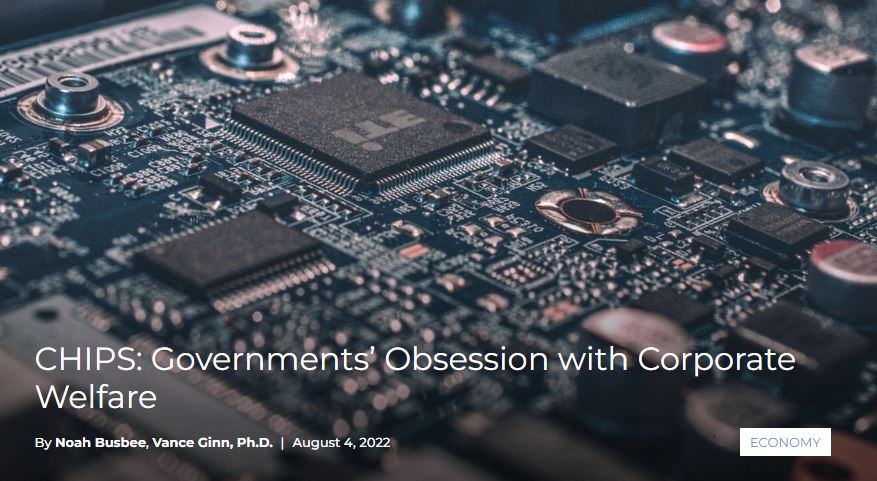|
The U.S. government is bankrolling favored businesses at the expense of taxpayers and other businesses. Again. By continually involving itself in the market, government is impeding economic growth and the potential of industries to reach their full potential. That must change.
Congress recently passed the CHIPS Act, which is a $280 billion spending boondoggle that will provide funding of $52.2 billion to computer chip manufacturers. To sweeten the pot, Congress is also offering a 25% tax credit for semiconductor fabrication, which could cost an estimated $24 billion over five years. And these subsidies could support production in other regions, such as China and Europe. President Joe Biden will sign this obscene corporate welfare scheme into law soon. Congress claims this will strengthen domestic semiconductor production and help the U.S. compete with China, but that rhetoric is wrong. Domestic production of these technologies has been slowing since 1990. The U.S. still has valuable domestic producers, like Texas Instruments and Intel, but these corporations recently accounted for 12% of global chip production in 2021, down from 37% in 1990, according to the Boston Consulting Group. While the federal government might seem smart for attempting to help this industry compete, its methodology is flawed. Expanding corporate welfare will only serve to degrade competition and diminish the free-market principles that uphold the U.S. economy. This flawed approach is apparent when considering the data around prices of chip production. The total 10-year cost of ownership of a new semiconductor fabrication plant in the U.S. is 30% higher than in Taiwan, South Korea, or Singapore, and 37% to 50% higher than in China—or $10 to $40 billion dollars depending on the product. Anywhere from 40% to 70% of the difference in price is directly attributable to the incentives government provides that contribute to reduced competition. Throwing taxpayer money at the problem is a solution in search of a problem. In 2021, the U.S. semiconductor industry had substantial growth. In the closing months of 2021, American sales increased by 5.2%. That year the market had the largest share of growth worldwide, expanding 27.4%. While recessions in the U.S. and elsewhere have reduced consumption of goods that use semiconductor chips and as production increases, there has been a reduction in shortages and lower chip prices—contributing to lower stock prices. While the U.S. lags China in semiconductor production, the U.S. industry is growing faster, and we still lead by large margins in research, development, and design. The U.S. industry is a leader in chip design, and accounts for roughly 60% of all global fabless firm sales, and some of the largest integrated device manufacturers. The U.S. accounts for the largest share of the global design workforce, speaking to our leadership and development prowess. Earmarking $76 billion of taxpayer money for an already growing industry while in the midst of a recession is politically irresponsible and economically destructive. Moreover, spending to this degree fuels the bloated national debt during a recession and puts upward pressure on inflation if the Federal Reserve monetizes the debt. While President Biden will likely sign the CHIPS Act, Congress ought not use this as a precedent to subsidize more industries. The outsourcing of semiconductor production should be a wake-up call to the burdensome overregulation, overspending, and over-taxation domestically on businesses; not a license to spend more taxpayer money. With more subsidies going to specific companies, less investment and the further fleeing of business from America to places with more attractive and beneficial economic circumstances will continue. Advocates like U.S. Sen. Tom Cotton tried to justify this bill by claiming that “by ceding semiconductor manufacturing and development to countries like China, the United States has fallen behind and given the Chinese Communist Party dangerous leverage over our nation.” While China has leverage over America in that department for now, this corporate welfare is economically harmful. In the process of providing cash to businesses, corporate welfare takes money from taxpayers and consumers, reducing economic growth and increasing the debt that has many risks—including economic and national security. Because corporate welfare disrupts natural market processes, it shifts money from the most productive economic actors to those less productive—but more politically connected. This creates economic inefficiency and stunts competition, making the situation worse. The U.S. government ought to instead cut the cost of doing business domestically by reducing government spending, taxes, and regulations. By correcting the current government failures in this market in this way, Americans will flourish more. Published at TPPF with Noah Busbee Comments are closed.
|
Vance Ginn, Ph.D.
|


 RSS Feed
RSS Feed